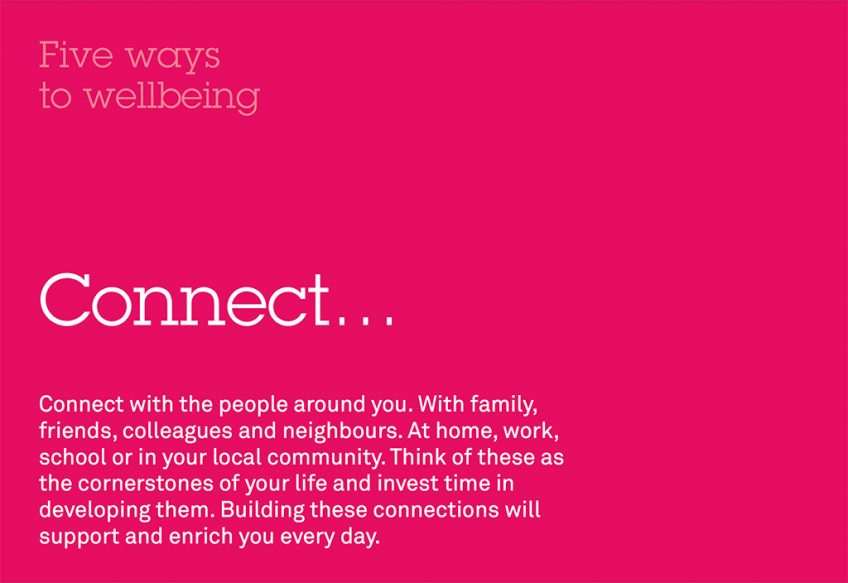We’ve all had days when it feels like the last thing you need to be doing is going out for a run or taking on voluntary work, but the 5 Ways to Wellbeing tool says that small, simple changes in our lives can make a big difference to our mental health and our physical health.
Wellbeing just means “feeling good and functioning.” Following the 5 Ways to Wellbeing won’t magically cure all the problems in your life, but it might give you a bit more strength to face them with, or at least give you a little break from whatever’s going on.
Connect
By connecting with other people, we feel more like a part of the same world and we also build relationships that we can rely on for support in the future. Connecting with others doesn’t necessarily mean you have to have conversations with strangers. It could mean texting a friend you haven’t seen in a while or messaging a relative or going for a cup of tea with your best friend. It might mean asking someone in a shop how their day is going when they serve you, or making more time for a friend who is struggling.
Be active
Exercise helps people feel good by stimulating endorphins in the brain. It can also give you a sense of achievement or give you an excuse to spend time with others or try something new. Being active doesn’t necessarily mean you have to run for miles and miles, although there’s nothing to stop you doing that if you want to! It could mean getting off the bus one stop earlier and walking the rest of the way home, or doing some stretches or taking the stairs instead of the lift in a shopping centre. Or you could do a few stretches when you get home.Whatever you do, you should choose a level of activity that fits for you, and don’t feel you have to knacker yourself out for it to be worthwhile.
Keep Learning
If you’re studying for GCSE exams at the moment, this might be the last thing you want to do! But if you’re looking for a way to stimulate your brain and boost your self-esteem, learning about something that interests you might be just the way to do it.Learning doesn’t have to be reading from a book, although there are plenty of free e-books available online nowadays. It could mean watching a documentary on Netflix, or trying something new like baking or origami. You can research things you’re interested in online, or ask people around you about their jobs and interests. If you’re stuck, try looking in a dictionary and learning a new word a day.
Take Notice
Most of the time we’re so focused on getting to wherever we’re going that we might not even notice the sights and sounds around us. Taking notice is about seeking out the weird and wonderful stuff around us, for example looking at the plants and trees we see on the way to school or listening out for sounds we can hear in the morning. One way of “taking notice” than can also help with stress or anxiety is the 5,4,3,2,1 technique. This is where you take notice of 5 things you can see around you, 4 things you can touch, 3 things you can hear, 2 things you can smell and 1 thing you can taste. If you struggle with this, you can swap the order around or make it the 3,2,1 technique. The idea is that flooding our brains with sensory information makes it easier for us to calm our thoughts.
Give
Helping others makes us feel happier about ourselves and also makes us feel that our time is well-spent. Giving doesn’t have to mean giving money, although if you have a lot of mess in your room you might want to consider clearing things out to take to a local charity shop. Giving can also mean giving your time, whether that’s through volunteering, helping out a friend with something they have to do, supporting someone through a difficult time or even just asking someone how they are and really listening to the answer.
Even a smile can be a gift that cheers someone’s spirits.
Here’s a link to view a leaflet with more information:
https://issuu.com/neweconomicsfoundation/docs/five_ways_to_well-being?viewMode=presentation
